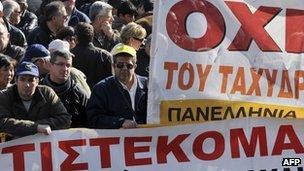The Greek cloud
- Published
- comments

Austerity is taking a heavy toll on Greek living standards
In October 2009 George Papandreou won the Greek election. Within days he discovered that the country's deficit was not 6.7% but 12.7%. So began a crisis that has spread to other countries and has come to dominate the EU and the eurozone.
It tells you something that in the third week of 2012 Greece is still not sorted. It will dominate both Monday's meeting of eurozone finance ministers and next week's European summit.
It is a story simply told. Austerity did not work, neither did the first bailout. The economy shrank and the debt mountain grew. The Germans insisted that if Greece was to have a second bailout then private investors had to take losses in order to slash the country's debts.
Talks over how to achieve that are on a knife edge. The target is to cut 100bn euros (£83bn) from Greece's debt mountain of 350bn euros. Only then might Greece be able to see its debt-to-GDP ratio fall to 120% by 2020.
So private investors are being asked to swap their current bond holdings for new ones worth half the value. That would involve them accepting losses of over 50%.
The sticking point is the interest paid on the new bonds, bearing in mind they will not mature for 30 years. If the rate is too low - say less than 3.8% - the investors will cry foul and insist the deal is no longer voluntary. If it isn't voluntary then Greece is in default.
The Germans and the IMF want a lower figure. Those talks will continue this week.
The expectation has to be of a deal. The EU, IMF and Germany fear a default more than anything else and the investors know that they will blink first.
Now if there is an agreement some are saying a major part of the eurozone crisis would have been fixed.
Francesco Garzarelli from Goldman Sachs said that in the event of a massive write-down "a systemic danger in the eurozone which comes from the weak link that is Greece will be removed".
Germany has insisted that nearly a third of Greek debt be written off before agreeing to lend Greece more bailout money.
Sick man of Europe
That brings us back to the real economy. In Greece it is expected to shrink by 6% this year and 3% next. There are some green shoots. Tourism is up and so are exports, but mainly the economy is in free-fall. Last year it missed its target for reducing its deficit. So this year a further 7bn euros in savings will have to be found.
Once again there will be open resistance on the streets and sullen resentment in the community. Reforms to open up the labour market and perhaps boost growth have stalled. Greece increasingly resembles a patient on permanent life-support; it is not being cured.
And that brings us to Italy. When it comes to European leaders Mario Monti is the poster boy of the moment. He is applauded and praised wherever he goes.
He has set about reducing Italy's deficit with vigour. Taxes have been increased, pensions reformed and the sales tax has gone up to 23%. Like in Greece he is making budget cuts as the country is heading back into recession.
He knows none of this will work without growth. So he has gone to battle with those closed professions like taxi drivers and pharmacists and lawyers. Suddenly he is meeting resistance.
Mario Monti has warned the rest of Europe of a powerful backlash which could turn the Italian people against Europe and Germany, the main architect of austerity. It is by now a familiar story of a leader bound into a monetary union having to change the culture of his country in order to try and regain competitiveness.
Germany's deep pockets
Ultimately the Italian leader does not believe that austerity alone will work. The answers, in his view, do not lie in Italy but elsewhere in Europe. He has revived the call for common European debt, so called eurobonds. He also wants to increase the size of the European Stability Mechanism, external, the zone's permanent bailout fund which will be up and running later this year.
In the end it comes back to wanting Germany to take on Europe's debts and to bankroll further the rescue fund. For the moment Berlin is saying "no" to both ideas, but many of Europe's economies are flashing "warning signs".
What is providing a breathing space was the decision by the European Central Bank to lend half a trillion euros to Europe's banks at a rate of just 1% over three years.
Some banks have started using the money to buy up bonds of countries like Italy at around 6%. It's good business for the banks and it is lowering the borrowing costs of countries at risk. It buys time, but does not address the real problem of countries locked into years of grinding austerity.
Elections are often revealing. Politicians choose a narrative that will play well with the people. Sometimes the script is honest; sometimes less so.
Francois Hollande, the front-runner to become the next French president, set out his stall yesterday. He has chosen to run against the markets. "My true adversary does not have a name, a face or a party. He never puts forward his candidacy but nevertheless he governs. My true adversary is the world of finance."
Big ideas may follow, but Europe is facing profound questions beyond saving the euro: Why does Europe have such sluggish growth? Is Europe's welfare state sustainable? How will work be found for millions of young people unemployed? Is the EU over-regulated?
In the end Europe's real economy will have to be fixed.